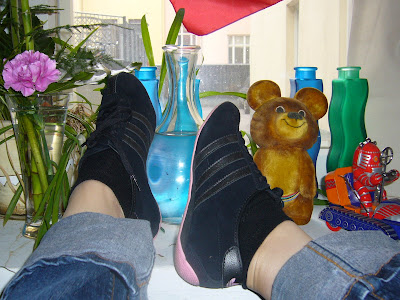
Arrests.
Threats.
Raided offices and confiscated computers.
A closed court case with activities surrounding it strongly implying there is no way the accused will be treated fairly. The police and the authorities not respecting the rule of law.
And all this has to do with Chechnya again, though surprisingly not in Russia but in the European Union.
The following is written for the European Court by the Lithuanian Human Rights workers. Best of luck to you and your case!
As for the kids in the orphanages... No-one has been able to create a healthy and stable future for them. That is just tragic. And totally unjust.
Please see Åsne Seierstad telling here who Mrs Gataeva really is: The Angel Of Grozny.
I also recommend this heartbreaking review in the New York Times website.
* * * * *
"Malik and Khadizhat Gataev were arrested in Kaunas, Lithuania on 15 October 2008. Until their arrest, the couple ran two large orphanages for children from Chechnya, one in Grozny, Chechen Republic of the Russian Federation, and one in Kaunas, Lithuania.
Khadizhat Gataeva has been featured in many journalistic accounts, in a film like “Three Rooms of Melancholia” by Finnish director Pirjo Honkasalo) and a recent book by Åsne Seierstad, The Angel of Grozny. Gataeva has been collecting orphans from the streets of Grozny and elsewhere since the first war broke out in Chechnya.
Mrs. Gataeva first established an orphanage in a refugee camp in Ingushetia, with help from foreign sponsors, and later moved back to Grozny. The husband Malik Gataev has been residing in Lithuania for the past decade and, until his arrest, he was running another orphanage there. Mrs Gataeva kept alternating from Chechnya to Lithuania.
The arrest of Mr and Mrs Gataev was carried out by the Lithuanian State Security Department (SSD), even if the nature of charge against the Gataev - extortion of money from their adult children (out of 17 children of the orphanage eight are young adults) - demands involvement of Criminal Police. The extortion charge brought against the Gataev does not fall under the authority of State Security Department whose main tasks are intelligence, counterintelligence, protection of state secrets, anti-terrorist activities and protection of national economy and strategic objects.
The State Security has been heavily involved in the Gataev case ever since the arrest of Mr and Mrs Gataev and has been cooperating closely with Kaunas Regional Prosecutor’s Office. The first private lawyer, who started working on the case in October 2008, dropped it shortly after his wife was ‘warned’ that she would lose the job if her husband continued working on the case.
The SSD initially blocked any access to the orphanage and kept it under strict surveillance. Evidence at our disposal indicates that the adult children of the orphanage were subjected to psychological pressure by the State Security Department and forced to report and cooperate with its agents, which in the end resulted in some of them testifying against their foster parents. Importantly, testimonies of some of the adult children were recorded on video prior to the trial. The prosecutor applied a measure of the Lithuanian Criminal Code that permits questioning of witnesses under the age of 18 prior to court proceedings, not to cause a psychological trauma or other serious consequences. However, all witnesses whose testimonies were recorded are over 18.
We also possess evidence that the Prosecutor in charge of the case and SSD are currently putting pressure on the adult children of the orphanage who are considered to be victims in the case but want to provide positive testimonies in defence of their foster parents. Last week, after one of the adult children, Denis Volkovskii, expressed his wish to provide positive evidence in person during the second hearing in the case at Kaunas City District Court on 24 February 2009, SSD agents summoned him to the SSD Kaunas office on 25 February where he was questioned for six hours by 6-7 SSD employees. During the questioning session, the agents threatened to imprison the Chechen youth for two years if he refused to provide evidence against his foster parents, or deport him from Lithuania. They also suggested that the best option for the young man would be to leave Lithuania till the court trial was over. After the questioning he was diagnosed with a psychological trauma and started undergoing medical treatment.
Prosecutor Nomeda Oškutyte and two employees of SSD had also visited the orphanage on 13 Jan 2009, after the first court hearing in the Gataev case took place. The prosecutor and VSD agents asked the young adults how they had found out about the court hearing. In an attempt of intimidation, the prosecutor vaguely threatened to detain some of the young.
SSD has also been putting constant pressure on the friends and supporters of the Gataev family who showed interest in their arrest and tried to help them and the children of the orphanage. Thus some of the Gataev friends and acquaintances were detained for short periods and harassed by SSD agents.
Most recently, on 2 February 2009, Prosecutor Oškutyte with two law enforcement agents arrived at the office of a translation company in Kaunas that belongs to Gataev family friend sand supporter Gintautas Bukauskas. Law enforcement agents raided the office and confiscated two desktop computers and all the available files of documents, thus effectively depriving Mr and Mrs Bukauskas from the means to run their business and earn income. The prosecutor remarked that the company of Mr Bukauskas had been 'very active' in the Gataev case and that he had obtained a lot of testimony letters from the acquaintances of Malik and Khadizhat Gataev to be presented at the court. The prosecutor also told Mrs Bukauskas that if she does not want her husband detained for two weeks, he should better stay away from the Gataev case."














































